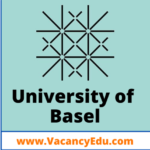Forschungszentrum Julich, Germany invites online Application for number of Fully Funded PhD Degree at various Departments. We are providing a list of Fully Funded PhD Programs available at Forschungszentrum Julich, Germany.
Eligible candidate may Apply as soon as possible.
(01) PhD Degree – Fully Funded
PhD position summary/title: PhD positions – High-performance Simulation and Optimization of Energy Systems
In response to the urgent demands arising from climate change in an ever-growing global economy, as well as the goal of reducing dependence on imported energy sources and raw materials, the European energy system is facing a paradigm shift: away from a system based on the import of fossil fuels and relying on centralized utilities operated by large power plants, towards a dynamic, supply- and demand-driven approach, often organized in local energy communities where renewable energy is the main source. To maintain an efficient, sustainable, and stable energy supply, the integration of different infrastructures such as the electricity, gas and heat sectors and the fluctuating availability of energy pose complex challenges for both the European energy system and local energy systems.
Deadline : Open until filled
(02) PhD Degree – Fully Funded
PhD position summary/title: PhD position – Optimal control theory for full-stack superconducting quantum processor
- Develop techniques to simulate and control the dynamics for increasing system complexities
- Implement and optimize small quantum circuits on superconducting qubits with respect to practical short-depth (NISQ) quantum algorithms
- Cooperate and actively work with experimental partners developing quantum processors using this technological platform
- Design and implement optimization techniques for full-stack improvement of quantum algorithms
- Model major sources of experimental error for control theory or for error mitigation techniques
Deadline : Open until filled
View All Fully Funded PhD Positions Click Here
(03) PhD Degree – Fully Funded
PhD position summary/title: PhD Position – Cryo-EM of membrane remodeling proteins
For the Ernst Ruska-Centre for Microscopy and Spectroscopy with Electrons under the direction of Prof. Sachse, you will be working on cryo-EM studies of membrane remodelling proteins in the field of Structural Biology at our institute. The Sachse lab recently determined a series of cryo-EM structures of bacterial as well as eukaryotic members of the endosomal sorting complexes required for transport (ESCRT) protein family. In order to gain a deep structural understanding, we biochemically purify and reconstitute ESCRT protein complexes in lipid environments and visualize them by cryo-EM methods. You will be working in a network of membrane biological research and latest cryo-EM infrastructure.
Deadline : Open until filled
(04) PhD Degree – Fully Funded
PhD position summary/title: PhD position – From controlling quantum processors to variational quantum algorithms
- Develop techniques to simulate and control the dynamics of increasingly more complex quantum systems
- Design and optimize implementations on atomic or superconducting processors from basic control components, to small circuits, to variational quantum algorithms
- Cooperate with experimental partners which build quantum processors
- Model major sources of experimental error for better control and error mitigation techniques
Deadline : Open until filled
(05) PhD Degree – Fully Funded
PhD position summary/title: PhD Positions – Development and Characterization of Tailormade Materials for Orbital Cinematography
We look for excellent candidates who are interested in experimental work
in the field of ultrathin and highly ordered molecular films.
Deadline : Open until filled
Polite Follow-Up Email to Professor : When and How You should Write
Click here to know “How to write a Postdoc Job Application or Email”
(06) PhD Degree – Fully Funded
PhD position summary/title: PhD Position – Electronic system design and modeling for qubit initialization and readout in a scalable quantum architecture
To make the vision of a universal quantum computer reality, we are working on scalable electronic architectures based on semiconductor spin quantum bits (qubits). For ultimately scaling up the number of qubits into the millions, it is crucial to move parts of the control electronics closer to the qubits. To achieve this, we design and implement integrated cryogenic circuits for qubit control and readout in state-of-the-art CMOS technologies. Since the qubits are extremely sensitive to disturbances and operate in temperatures down to a few hundred millikelvins, the requirements on power consumption, noise and area are severe. For this reason, it is necessary to develop new and groundbreaking architectures and circuit topologies. Modeling electronics and their interfaces to qubits in this challenging environment is an essential part of this. Specific tasks are
Deadline : Open until filled
(07) PhD Degree – Fully Funded
PhD position summary/title: PhD Position – Electronic system design and modeling for scalable long-range qubit coupling architecture
To make the vision of a universal quantum computer reality, we are working on scalable electronic architectures based on semiconductor spin quantum bits (qubits). For ultimately scaling up the number of qubits into the millions, it is crucial to move parts of the control electronics closer to the qubits. To achieve this, we design and implement integrated cryogenic circuits for qubit control and readout in state-of-the-art CMOS technologies. Since the qubits are extremely sensitive to disturbances and operate in temperatures down to a few hundred millikelvins, the requirements on power consumption, noise and area are severe. For this reason, it is necessary to develop new and groundbreaking architectures and circuit topologies. Modeling electronics and their interfaces to qubits in this challenging environment is an essential part of this. Specific tasks are:
Deadline : Open until filled
(08) PhD Degree – Fully Funded
PhD position summary/title: PhD Position – Robust Energy Supply: The impact of disruptive events on the security of supply of the integrated German energy system
Current political events highlight the vital importance of a robust and affordable energy supply. This thesis will primarily address questions pertaining to the security of supply of the existing and future sector-coupled German energy system within both a European and global context. In the course of this research, you will investigate which disruptive events and crises could endanger the security of supply and what an effective strategy for a robust energy supply could look like.
Thereby, you will identify potentially disruptive events from the perspective of energy demand and derive short- and medium-term scenarios so as to be able to investigate them using existing energy system models from the IEK-3. In doing so, you will explore questions such as: What black swan events, natural disasters, political decisions or crises, and what technological innovations, would be conceivable and how can these be modeled? How would these affect the energy system, and how would the energy system need to be designed for a robust energy supply? To answer these, you will contribute to the further development an existing energy system model based on Python. Your tasks include:
Deadline : Open until filled
Click here to know “How to Write an Effective Cover Letter”
(09) PhD Degree – Fully Funded
PhD position summary/title: PhD Positions – Quantitative Plant Sciences
You have a deep interest in how plants optimize nutrient acquisition and acclimate to different soil conditions. You are curious about root functioning and preferably have some experience within plant root research, for example during your master thesis work. You enjoy designing, conducting, and analysing experiments. You enjoy math and quantitative approaches in science and have some affinity with modelling and or computer programming.
Deadline : Open until filled
(10) PhD Degree – Fully Funded
PhD position summary/title: PhD Position – Cryogenic CMOS for Quantum Computing
- Fabrication of nanometer transistors with small nanowires in the cleanroom of the Helmholtz Nano Facility (HNF)
- Analysis of electrical properties of the devices by a variety of characterization, for example I-V, C-V and pulse measurements at both room temperature and cryogenic temperature
- Interaction with other group members, working on fabrication process and electronic characterization for continuous device optimizations
- Collaboration with international partners regarding device simulations and specific characterizations
Deadline : Open until filled
Connect with Us for Latest Job updates
(11) PhD Degree – Fully Funded
PhD position summary/title: Doctoral Project Opportunity – Correlative Optical, X-Ray and Electron Tomography
Understanding how neurons and entire brain regions are interconnected requires covering length scales from molecular (nanometers) to the cellular range (micrometers), up to the entire brain. In the research project state-of-the-art optical, serial electron microscopy and synchrotron X-ray methods will be combined to meet this multiscale challenge. The project will involve all aspects of the techniques including sample preparation, experimental development and the handling and analysis of massive data sets. The research project will combine 3D-polarized light microscopy (3D-PLI), serial scanning electron microscopy (sSEM) and synchrotron scanning microbeam X-ray diffraction (sµXRD) combining expertise from the institutes INM-1 and JCNS-1 at Forschungszentrum Jülich.
Deadline : 7.8.2023
Polite Follow-Up Email to Professor : When and How You should Write
(12) PhD Degree – Fully Funded
PhD position summary/title: Doctoral Project Opportunity – Physics and Neural Network-Based Combinatorial Optimization
There is a current opening for a doctoral project that would work at the intersection of statistical physics, neural network hardware in neuromorphic systems, and computer science. The project area is to tackle a large class of important computational problems that still challenge science and technology: NP hard problems in combinatorial optimization, which includes scheduling, routing, and many resource allocation problems. The approach will be to combine insights from statistical physics in understanding hardness of such problems and the dynamics of solvers, with biologically-inspired computational hardware approaches to build more energy-efficient physical systems.
Deadline : 7.8.2023
(13) PhD Degree – Fully Funded
PhD position summary/title: Doctoral Project Opportunity – Local Self-Supervision for Closed-Loop Visual Reasoning
The institutes PGI-15 and INM-6 have a common aim to understand brain function from a computa-tional point of view, and use this knowledge to create new technologies. Despite the success of recent AI models, the brain is still unparalleled in its ability to adapt to complex environments, and does so in a highly energy-efficient manner. This project aims to combine local learning and neuro-morphic computing to achieve energy efficient networks that can reason in complex environments. You will work on layer-local self-supervised learning rules in context-modulated network architec-tures. We will test these learning rules in a brain-inspired multitask setting, where a single network should learn to solve large numbers of tasks in a context-dependent manner. We will then embed the networks in a closed-loop visual reasoning architecture. The resulting system will be imple-mented on neuromorphic hardware, such as memristive crossbar arrays and/or Intel Loihi.
Deadline : 7.8.2023
(14) PhD Degree – Fully Funded
PhD position summary/title: Doctoral Project Opportunity – Lattice Damage by Hydrogen at Sub-Threshold Ion Energies
Hydrogen (H), the most prospective carbon-neutral energy carrier, is a ubiquitous impurity in crystalline solids exhibiting many unique properties upon interactions with lattice atoms and/or crystal defects. One such unique property is the unexpected formation of lattice damage and in turn H-supersaturated surface layers (HSSL) in metals exposed to H plasma/ion irradiation with sub-threshold ion energies. Sophisticated experimental design and advanced techniques are available to ‘see’ H retained at defect microstructures in the nanometer-thick HSSL and to further explore its formation mechanism, microstructure evolution process, including but not limited to transmission electron microscopy (TEM), nuclear reaction analysis (NRA) and atom probe tomography (APT). The project will be jointly supervised by experts from the Institute of Energy & Climate Research (IEK-4: Plasma Physics) and the Ernst Ruska-Centre for Microscopy and Spectroscopy with Electrons (ER-C-2: Materials Science and Technology).
Deadline :7.8.2023
(15) PhD Degree – Fully Funded
PhD position summary/title: Doctoral Project Opportunity – DNP NMR Based Surface Profiling of Functional Nanomaterials
Surfaces are crucial for the functional properties of a wide variety of materials. Nuclear magnetic resonance (NMR) spectroscopy is often the best and sometimes the only suitable method to provide structural information about disordered surfaces and surface functionalization. To approach the sensitivity and selectivity limitations of standard NMR, an electrochemistry (IEK-9, https://www.fz-juelich.de/de/iek/iek-9/) and a structural biology institute (IBI-7, https://www.fz-juelich.de/de/ibi/ibi-7/) join forces in order to develop and apply surface-selective dynamic nuclear polarization (DNP) NMR techniques, targeting amyloid fibrils and battery interfaces.
Deadline : 7.8.2023
(16) PhD Degree – Fully Funded
PhD position summary/title: Doctoral Project Opportunity – Corrosion Resistant Coatings for PEM Electrolysis
The main objective of the project is the development of affordable, long-term stable corrosion resistant coatings especially for the anode side of the PEM electrolysis. To achieve this an in-depth characterization of the deposited coatings and the formed oxide scales will be performed. A combinatoric approach will allow a fast optimization. The project will be jointly supervised by experts form the institute of Energy and Climate Research (IEK-1: Materials Synthesis and Processing) and the Ernst Ruska-Centre for Microscopy and Spectroscopy with Electrons (ER-C-2: Materials Science and Technology).
Deadline :7.8.2023
Top 16 Tools for Researchers in 2022
(17) PhD Degree – Fully Funded
PhD position summary/title: Doctoral Project Opportunity – An Organoid Co-Culture System as a Model for Traumatic Brain Injury (TBI)
Traumatic brain injury (TBI) is driven by diffuse astroglial and neuronal injury followed by secondary injury cascades of cellular toxicity, inflammation, and aggregation of toxic proteins. However, the complex interplay of glial cells remains to be elucidated in both trauma and regeneration. Our current mechanistic understanding of TBI in in vitro models has been primarily derived from two-dimensional models. Nevertheless, the in vivo situation is much more complex and warrants 3D impact platforms, addressing the spatiotemporal details of cellular injury strains on human interconnected neuronal-astroglial networks. Using 3D brain organoids incorporating microglia (INM-3) combined with fast forming, simplified neural co-culture systems (IBI-2), the doctoral researcher will use both systems to apply defined strain and compression signals simulating TBI.
Deadline : 7.8.2023
(18) PhD Degree – Fully Funded
PhD position summary/title: Doctoral Project Opportunity – CMOS Energy Harvesting for Big Data Applications
The generation of excess heat is a major bottleneck of semiconductor-based electronics, ranging from small scale wearable applications up to large supercomputers. In turn, by developing suitable on-chip and CMOS compatible thermoelectric technologies, not only internet-of-things applications like wearables could be operated by the body temperature alone, but also a significant contribution to the reduction of greenhouse gas emissions caused by computing could be made by energy reutilization at operating temperatures below 100°C. The objective is to enable SiGeSn as a novel Si-compatible thermoelectric material able to operate at room or body temperature.
Deadline : 7.8.2023
(19) PhD Degree – Fully Funded
PhD position summary/title: Doctoral Project Opportunity – Novel Glutamate Sensors for Neuroscience and Biotechnology
Glutamate is the main excitatory neurotransmitter in our brain, and impaired glutamate homeostasis causes various neurological diseases. In bacteria, glutamate is the major amino group donor and crucial for the industrial production of chemicals in white biotechnology. To understand glutamate homeostasis in these two system, a neuroscience (IBI-1 https://www.fz-juelich.de/en/ibi/ibi-1) and a biotechnology institute (IBG-1, https://www.fz-juelich.de/de/ibg/ibg-1/forschung/systemische-mikrobiologie) have teamed up to generate novel fluorescent sensors that permit the quantification of intracellular glutamate concentrations in living cells in real time.
Deadline :7.8.2023
How to increase Brain Power – Secrets of Brain Unlocked
(20) PhD Degree – Fully Funded
PhD position summary/title: PhD Position – Molecular-Beam Epitaxy of Topological Insulators / Superconductor Structures
- Study the growth of EuSe films and characterize their structural and electronic properties
- Strong interaction with other members of Peter Grünberg Institute – Semiconductor Nanoelectronics (PGI-9), who work in the field of TIs
- Have collaborations with researchers within Peter Grünberg Institute, as well as the consortia of JARA-Fit https://jara.org/de and the ML4Q project https://ml4q.de
Deadline : Open until filled
(21) PhD Degree – Fully Funded
PhD position summary/title: PhD Position – Investigation of Biomass Fractionation Techniques for Cellulose Fiber Production from non-wood Biomass (w/m/d)
We look for excellent candidates who are interested in experimental work in the context of integrated biorefinery systems for biomass fractionation
Your primary tasks will be:
- Chemical and structural analysis of different non-wood biomass types
- Experimental investigation of organosolv based biomass fractionation techniques
- Development of suitable process concepts for the developed fractionation techniques
- Production and evaluation of non-wood biomass derived cellulose fibers
- Application studies for cellulose fiber material
Deadline : 31.7.2023
(22) PhD Degree – Fully Funded
PhD position summary/title: PhD-Position – Lattice Quantum Field Theory
- performing simulations of lattice quantum field theory (QCD/low dimensional models),
- developing analysis methods and tools and simulation software,
- analyzing, publishing and presenting the results,
- while collaborating with other NRW-FAIR scientists
Deadline : Open until filled
(23) PhD Degree – Fully Funded
PhD position summary/title: PhD Position – Study the Protein / Protein Interface Energetics by Means of Free Energy Calculations Performed Using ML/MM Potentials
Protein–protein interactions (PPIs) mediate a vast number of cellular pathways and processes, making them an important class of targets for drug discovery. However, decades of effort aimed at developing small molecule drugs to modulate PPIs have been rewarded with a relatively modest number of successes. The difficulty is thought to arise primarily from topology; The key issues of code scalability and the time scale problem will be addressed for the first time using a recently developed method that builds on metadynamics – an exact method to compute free energies – and the statistical mechanics of paths.
Deadline : Open until filled
(24) PhD Degree – Fully Funded
PhD position summary/title: PhD position – Modeling RNA with artificial intelligence and computer simulations
In this position, you will interface between the “Applied Machine Learning” lab and the “Computational Structural Biology” research group. Together, we are developing a new method to perform computer simulations of RNA based on machine learning. We will start with atomic resolution simulations, which we will then coarse-grain.
Deadline : Open until filled
(25) PhD Degree – Fully Funded
PhD position summary/title: PhD Position – Development of new UHV Technologies for the “Einstein Telescope for Graviational Waves Detection”
Gravitational waves from colliding black holes, exploding stars or maybe from dark ages of the universe tell us about the evolution of our cosmos. Following the Nobel Prize in physics of 2017, we are now planning the next generation of even more sensitive observations. The so-called “Einstein-Telescope” (ET) is European`s future in gravitational wave detection. It might be built in the Euregio. For more information, see https://www.einsteintelescope.nl or https://www.et-gw.eu . Gravitational waves are detected by laser interferometers based on the concept of the Michelson Interferometer. The ET will include six of those interferometers with arm lengths of 10 km each in an underground, triangular configuration. To avoid interaction of the laser beams with air or any residual gas the laser beams will travel in ultrahigh vacuum tubes (UHV) with a diameter of approximately 1 m. In total, there will be 120 km of those tubes. It will be by far the largest UHV system ever built. You will work on the design of the vacuum system. Depending on qualification and interest your tasks could be:
Deadline : 6.8.2023
(26) PhD Degree – Fully Funded
PhD position summary/title: PhD Position – Synthesis Automation
You will be part of the Novel Catalyst Design department, headed by Prof. Dr. Marc Ledendecker. The department focuses on the fabrication of metal-based, inorganic catalysts for the global energy transition. We use many different nanoparticles to fabricate highly active supported catalysts. This PhD thesis specifically focuses on automating the synthesis route of e.g. platinum based and iridium oxide based catalysts for acidic water splitting reaction as used in polymer electrolyte membrane units (e.g. https://onlinelibrary.wiley.com/doi/full/10.1002/aenm.202301450 ). At the same time, you will have the opportunity to do your PhD at the Technical University of Munich (TUM) (incl. graduate school) and also to use the infrastructure of TUM. Your tasks in detail:
Deadline : 6.8.2023
(27) PhD Degree – Fully Funded
PhD position summary/title: PhD Position – Nanostructured Catalysts
You will be part of the “Novel Catalyst Design” department, headed by Prof. Dr. Marc Ledendecker. The department focuses on the fabrication of metal-based, inorganic catalysts for the global energy transition. We use many different nanoparticles to fabricate highly active supported catalysts. Specifically, this dissertation focuses on the preparation of platinum-based and iridium oxide-based catalysts for the acidic water splitting reaction as used in polymer-electrolyte membrane units (e.g., https://onlinelibrary.wiley.com/doi/full/10.1002/aenm.202301450 ). You will simultaneously have the opportunity to do your PhD at the Technical University of Munich (TUM) (incl. graduate school) and also use the infrastructure of TUM. Your tasks in detail:
Deadline : 6.8.2023
(28) PhD Degree – Fully Funded
PhD position summary/title: PhD position – Oxide interface electronics towards field-controlled polaritonics
In this position, you will be guided to lead your own project in the field of oxide interface electronics. Inspired from state-of-the-art silicon technologies, you will create confined electronic systems with the goal to create a link between the confinement of electrons and their interaction with electric fieds and light irradition, aiming at novel applications in photonics.
Deadline : Open until filled
(29) PhD Degree – Fully Funded
PhD position summary/title: PhD Position – Stability at Nanoscale during Electrochemical Processes via Operando Liquid-Phase TEM
At the „Electrocatalysis“ department of Prof. Karl Mayrhofer, we offer a PhD position within the team „Nanoanalysis of Electrochemical Processes“ lead by Dr. Andreas Hutzler. We are investigating degradation mechanisms within the framework of green energy conversion and climate change. The open position aims to understand catalyst stability at the nanoscale during electrochemical processes via operando liquid-phase transmission electron microscopy (LP-TEM). Your tasks in detail:
Deadline : 14.8.2023
(30) PhD Degree – Fully Funded
PhD position summary/title: PhD Position – Chloride homeostasis in neuronal and glial cells
The PhD project focuses on the chloride homeostasis in neurons and glia and their changes under conditions with insufficient energy supply. We are interested in understanding how cells in the central nervous system control volume, ion gradients and transport functions under conditions with reduced energy supply, for example during vascular events. Available methods range from neuronal and glial cell culture and cellular electrophysiology to fluorescence microscopy and fluorescence lifetime imaging in acute and cultured slice preparations.
Deadline : 14.8.2023
(31) PhD Degree – Fully Funded
PhD position summary/title: PhD-Position – Development of scalable superconducting quantum systems
This position focuses on building, operating, and testing superconducting quantum devices. Your tasks in detail are:
- Design and fabrication of superconducting quantum circuits
- Setting up experimental systems for cryogenic measurements
- Development of a microwave quantum control & readout stack
- Development of Python code to operate quantum systems
- Detailed experimental characterization of superconducting qubits to quantify performance and identify limiting physical mechanisms
- Perform quantum device calibrations, benchmarking, and run quantum algorithms
- Presenting and publishing the research on an international stage
Deadline : Open until filled
(32) PhD Degree – Fully Funded
PhD position summary/title: PhD position – Automated creation of energy engineering models for urban districts to assess disruptive events on the security of supply
- Development of dynamic simulation models in Modelica
- Verification and validation of simulation models
- Further development of methods for automated generation of simulation models based on publicly available data (e.g. OpenStreetMap)
- Integration of models into co-simulation platforms
- Extension and maintenance of database systems
- Supporting the development of model predictive control (MPC) algorithms
- Supporting the development activities of model libraries
- Supervision of student theses
- Publication of the achieved results in professional journals
Deadline : Open until filled
(33) PhD Degree – Fully Funded
PhD position summary/title: PhD Position – Digital twins in safeguarding nuclear waste management
Digital twins are already used in many industrial and planning applications. In nuclear engineering for example, they are used and further developed to improve the safety, operation and design of nuclear facilities. Digital twins also have a high potential for international nuclear material safeguards,e.g. for inspection planning, for optimizing the use of safeguards technologies, and for training purposes. The aim of this work is to explore the possibilities and limits of digital twins in safeguarding nuclear facilities, using the example of an interim storage facility and a geological repository for highly radioactive waste. Your tasks in detail:
Deadline : Open until filled
About Forschungszentrum Julich, Germany –Official Website
Forschungszentrum Jülich is a member of the Helmholtz Association of German Research Centres and is one of the largest interdisciplinary research centres in Europe. It was founded on 11 December 1956 by the state of North Rhine-Westphalia as a registered association, before it became “Kernforschungsanlage Jülich GmbH” or Nuclear Research Centre Jülich in 1967. In 1990, the name of the association was changed to “Forschungszentrum Jülich GmbH”. It has close collaborations with RWTH Aachen in the form of Jülich-Aachen Research Alliance (JARA).
Disclaimer: We try to ensure that the information we post on VacancyEdu.com is accurate. However, despite our best efforts, some of the content may contain errors. You can trust us, but please conduct your own checks too.
Related Posts
- 04 PhD Degree-Fully Funded at Erasmus University Rotterdam, Netherlands

- 04 PhD Degree-Fully Funded at Masaryk University, Czech Republic

- 11 PhD Degree-Fully Funded at University of Bergen, Bergen, Norway

- 09 PhD Degree-Fully Funded at University of Groningen, Netherlands

- 16 PhD Degree-Fully Funded at Cranfield University, England

- 14 PhD Degree-Fully Funded at University of Liverpool, England

- 08 PhD Degree-Fully Funded at Linkoping University, Sweden

- 05 PhD Degree-Fully Funded at University of Basel, Switzerland

- 06 PhD Degree-Fully Funded at Swansea University, Wales, United Kingdom












